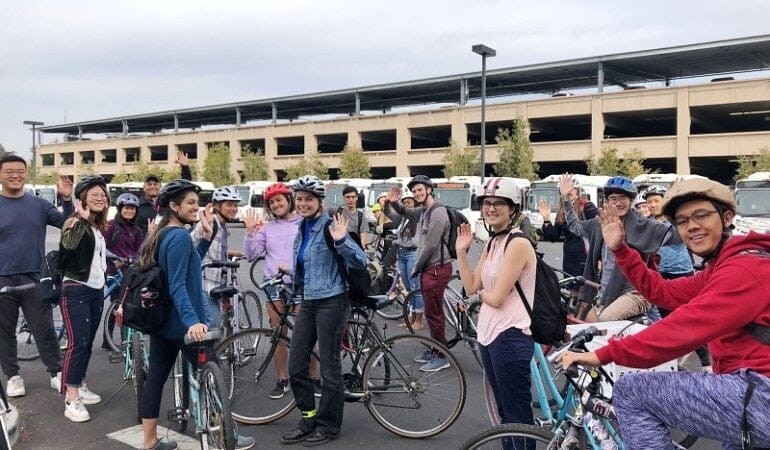
Curriculum Innovation
Over the past ten years, more than 200 students at Stanford University have had the chance to work with Bay Area government agencies and nonprofits on real-world projects related to digital inclusion, transit-oriented development, youth development, and other urban challenges. Through a combination of in-class instruction and fieldwork-based learning, Deland Chan’s Sustainable Cities course aims to prepare students for careers in sustainability, urban planning, and related fields.
Chan, Director of Community Engaged Learning in Stanford’s Program on Urban Studies, is one of four recipients of the 2019 Curriculum Innovation Award. Given annually by the Lincoln Institute of Land Policy and the Association of Collegiate Schools of Planning, the award recognizes undergraduate and graduate courses that prepare future planners to solve economic, social, and environmental challenges. Courses must demonstrate innovative design, incorporate expertise from multiple disciplines, integrate theory and practice, and actively use student feedback to improve course design and teaching practice. The application for next year’s awards is now open. The submission deadline is February 10, 2020. Selected applicants receive a monetary award and the opportunity to publish their course in the Lincoln Institute’s global online catalogue of learning resources.
“We put forth the request for proposals to learn about what is innovative, effective, and engaging in this field,” said Ge Vue, who oversees the Lincoln Institute’s own curriculum development efforts as its associate director of instructional design. “We want to try to inspire more institutional support for teaching like this at the university level. Faculty on tenure track are often discouraged from focusing on pedagogy because what is awarded is their original research, but the two are not in conflict—they can amplify each other.”
Vue noted that the winning projects reflect the power of institutional support—Chan’s course, for example, is part of Stanford’s Human Cities Initiative, which brings together an interdisciplinary community of faculty, students, and community stakeholders to “identify urbanization challenges at different stages of development and support technological, policy, and design solutions.”
Vue also emphasized that building successful courses is a multiyear commitment that requires the same amount of thought and planning that go into research. As the work of the award recipients demonstrates, building partnerships with community organizations and building enthusiasm among alumni of the course can help sustain these courses over time and allow room for evolution and improvements.
Award recipient Sonia Roitman, a senior lecturer at the School of Earth and Environmental Sciences at the University of Queensland, relies on close partnerships to execute her course, which examines development challenges in Indonesia. Taught since 2015, the course enables students to apply theoretical knowledge learned throughout the semester during a 10-day trip to three informal settlements in Yogyarkarta, Indonesia. Students carry out participatory research methods with residents. They also meet with local governments and community organizations to learn about government policies and actions regarding a number of local challenges.
Other courses recognized use innovative tools such as games. Students in Marcos Barinas Uribe’s class at the Universidad Iberoamericana in the Dominican Republic spend the first half of the semester learning about game design; in the second half, they put this theoretical knowledge into practice by building prototypes and testing their games with city officials. Barinas sees board games as one way to integrate public interest into urban planning curricula.
Gislene Pereira and Leticia Nerone Gadens, who teach urban planning at the Federal University of Paraná in Curitiba, Brazil, employ a combination of games, debates, and exhibitions to teach the concept of land value capture in Brazil. The class is offered to undergraduate and graduate students, as well as public managers such as technicians and advisors who work in the area of urban planning and management.
“The structure of the course is based on the inseparability of teaching, research, and extension activities,” the instructors explain. The course is made up of a series of flexible modules and activities that can be adapted to the context and time constraints of different professors and professionals.
“These projects show others what is possible, but also what it takes to make it possible,” Vue said.
Emma Zehner is communications and publications editor at the Lincoln Institute of Land Policy.
Photograph: Students take a bike tour as part of Deland Chan’s course at Stanford. Credit: Ariadne Scott.
